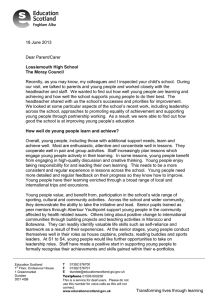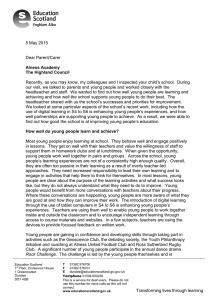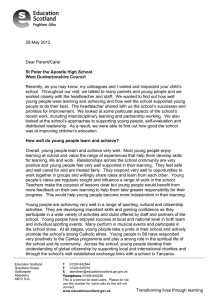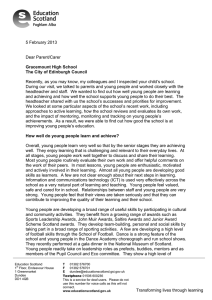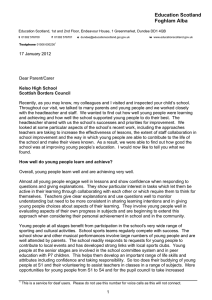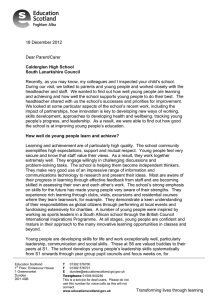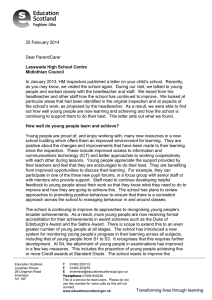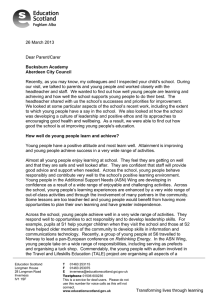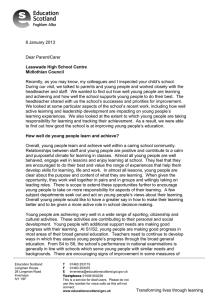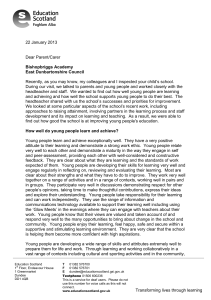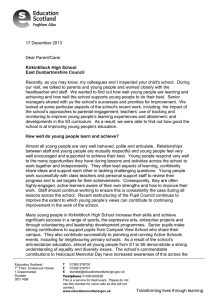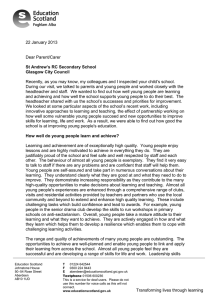12 March 2013 Dear Parent/Carer
advertisement
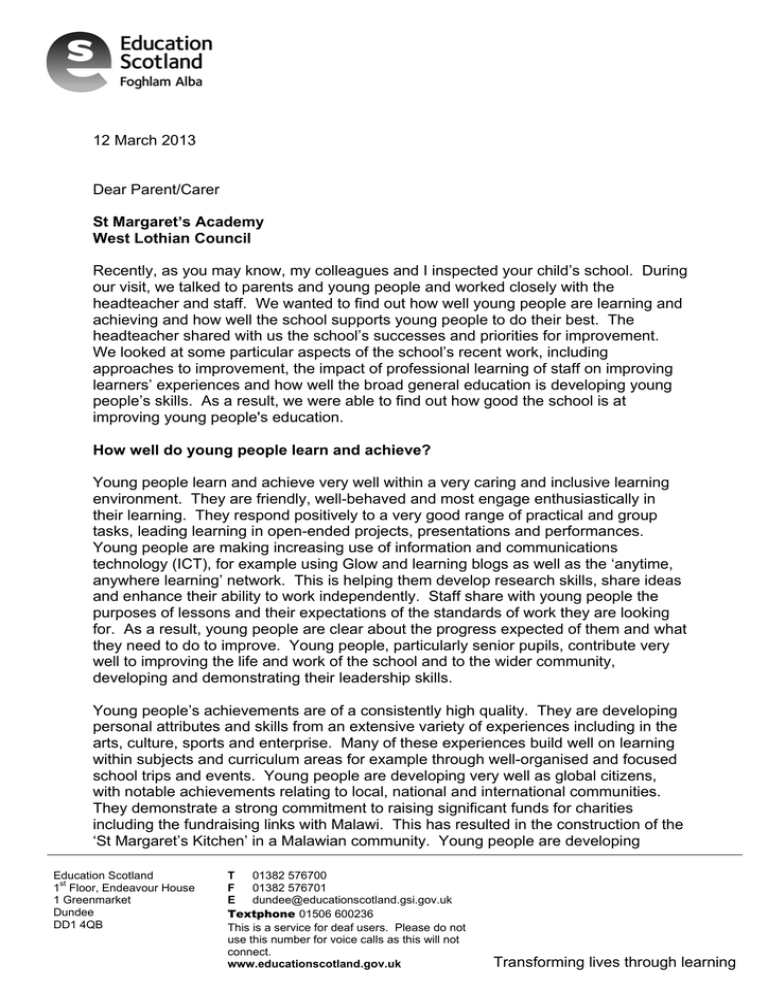
12 March 2013 Dear Parent/Carer St Margaret’s Academy West Lothian Council Recently, as you may know, my colleagues and I inspected your child’s school. During our visit, we talked to parents and young people and worked closely with the headteacher and staff. We wanted to find out how well young people are learning and achieving and how well the school supports young people to do their best. The headteacher shared with us the school’s successes and priorities for improvement. We looked at some particular aspects of the school’s recent work, including approaches to improvement, the impact of professional learning of staff on improving learners’ experiences and how well the broad general education is developing young people’s skills. As a result, we were able to find out how good the school is at improving young people's education. How well do young people learn and achieve? Young people learn and achieve very well within a very caring and inclusive learning environment. They are friendly, well-behaved and most engage enthusiastically in their learning. They respond positively to a very good range of practical and group tasks, leading learning in open-ended projects, presentations and performances. Young people are making increasing use of information and communications technology (ICT), for example using Glow and learning blogs as well as the ‘anytime, anywhere learning’ network. This is helping them develop research skills, share ideas and enhance their ability to work independently. Staff share with young people the purposes of lessons and their expectations of the standards of work they are looking for. As a result, young people are clear about the progress expected of them and what they need to do to improve. Young people, particularly senior pupils, contribute very well to improving the life and work of the school and to the wider community, developing and demonstrating their leadership skills. Young people’s achievements are of a consistently high quality. They are developing personal attributes and skills from an extensive variety of experiences including in the arts, culture, sports and enterprise. Many of these experiences build well on learning within subjects and curriculum areas for example through well-organised and focused school trips and events. Young people are developing very well as global citizens, with notable achievements relating to local, national and international communities. They demonstrate a strong commitment to raising significant funds for charities including the fundraising links with Malawi. This has resulted in the construction of the ‘St Margaret’s Kitchen’ in a Malawian community. Young people are developing Education Scotland 1st Floor, Endeavour House 1 Greenmarket Dundee DD1 4QB T 01382 576700 F 01382 576701 E dundee@educationscotland.gsi.gov.uk Textphone 01506 600236 This is a service for deaf users. Please do not use this number for voice calls as this will not connect. www.educationscotland.gov.uk Transforming lives through learning enterprising attitudes and skills through involvement in Young Enterprise. Those who take part in the work of the Fair Trade group achieve a good understanding of aspects of international trade and ethical consumerism. Many young people have received recognition for their skills they have developed through an increasing range of accredited awards including The Duke of Edinburgh’s Award Scheme, Caritas Awards, Sport Leadership, and CREST Science Awards. From S1-S3, most young people are making very good progress in their broad general education. From S4-S6, in almost all levels, school performance is improving and is consistently above national averages, and better than those schools which serve young people with similar needs and backgrounds. Young people with additional support needs, including those with English as an additional language, are making very good progress in their learning. Almost all young people leave school to go on to further study, employment or training. How well does the school support young people to develop and learn? Young people across the school are very well supported to develop and learn. Staff know learners very well and use a wide range of well-judged approaches to meet their needs effectively. Specialist staff ensure a range of effective support for young people. All staff are committed to young people’s welfare and achievement. They work well together to ensure that they meet the needs of every young person, especially the most vulnerable. The school has a commendable emphasis on promoting young people’s mental health. Approaches such as the innovative nurture programmes in the ‘Green Room’ and counselling are effectively supporting young people with social, emotional and behavioural needs. Staff work well with a broad range of support agencies who make important contributions to young people’s development. The school is continuing to develop its approaches to planning support, and to improving the pace and the level of challenge in learning for young people. The school’s teamwork approaches to taking forward Curriculum for Excellence are exemplary. Changes to the curriculum are the result of careful long-term planning, discussion and consultation with staff, parents, young people and partners. All young people are benefitting from a flexible curriculum which meets their individual needs. Staff are confidently and enthusiastically developing new courses and approaches for young people in S1 to S3, enabling them to experience a broad curriculum with opportunities for ‘depth studies’ in S3. The school is developing a good range of well-planned opportunities for learning through personal achievement and a growing range of innovative interdisciplinary learning. The curriculum from S4 to S6 provides an extensive range of flexible progression routes for young people, enhanced by the effective links with West Lothian College and other local schools. Curriculum and support as young people move from primary school to S1 are a particular strength. Through the Pathways Programme, teachers plan carefully to ensure all young people benefit from continuity and progression in their learning as they move from stage to stage. How well does the school improve the quality of its work? The headteacher provides inspirational and outstanding leadership, empowering staff and young people to drive forward improvement. His approach to change 2 management is particularly commendable, ensuring staff across the school are fully involved. He is supported extremely well by his highly-effective depute headteachers and extended leadership team. Leadership is strong and highly effective, with staff across the school skilfully taking leadership roles in a range of school developments and activities. The comprehensive and systematic approaches to self-evaluation, professional learning for staff and leadership development are at the core of the school’s success in improving learning, attainment and achievement. The SEAMS (Self-evaluation at St. Margaret's) programme, reviews at faculty and whole-school level, and ‘learning rounds’ have all been successful in improving learning and teaching. Good practice is developed and shared through teachers visiting one another’s lessons, and also through visits to lessons by senior managers, teachers from other schools, and young people. The school has used self-evaluation and professional learning for staff exceptionally well to take forward Curriculum for Excellence and in ongoing curriculum development and review. This inspection found the following key strengths. • • • • • The headteacher’s outstanding leadership and skilful management of change. The commitment of staff and teamwork to improve young people’s learning experiences and attainment. Young people’s contribution to the life of the school, and the range of their achievements. The positive impact on young people of the school’s spiritual life and inclusive ethos. Approaches to self-evaluation which are transforming young people’s learning. We discussed with staff and the education authority how they might continue to improve the school. This is what we agreed with them. • Continue to improve the broad general education for young people from S1 to S3. What happens at the end of the inspection? We are satisfied with the overall quality of provision. We are extremely confident that the school’s self-evaluation processes are leading to improvements. As a result, we will make no further evaluative visits in connection with this inspection. During the inspection, we identified aspects of innovative practice which we would like to explore further in order to share the practice with others. As a result we will work with the school and local authority in order to record and share more widely the innovative practice. We will ask the school, in discussion with the local authority, to let parents know the outcome of the innovative practice visit(s). Mary Hoey HM Inspector 3 Additional inspection evidence, such as details of the quality indicator evaluations, for your school can be found on the Education Scotland website at http://www.educationscotland.gov.uk/inspectionandreview/reports/school/primsec/StM argaretsAcademyWestLothian.asp. If you would like to receive this report in a different format, for example, in a translation please contact the administration team on the above telephone number. If you want to give us feedback or make a complaint about our work, please contact us by telephone on 0141 282 5000, or e-mail: complaints@educationscotland.gsi.gov.uk or write to us addressing your letter to the Complaints Manager, Denholm House, Almondvale Business Park, Livingston EH54 6AG. 4
